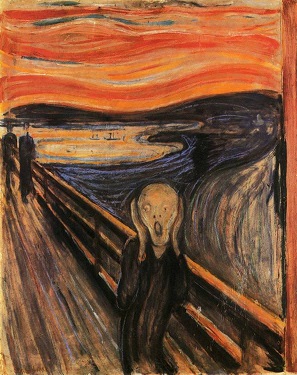 Solutions to stress are everywhere. Suggestions come in the form of mindfulness exercises, stress reducing phone apps, recipes for calming teas, and soothing music to help navigate the daily traffic jam.
Solutions to stress are everywhere. Suggestions come in the form of mindfulness exercises, stress reducing phone apps, recipes for calming teas, and soothing music to help navigate the daily traffic jam.
Yet, for some, these apparent stress reducers prove inferior to something much more primal and less fussy than boiling water for tea. For those people, the answer might be—the scream.
Like the famous painting The Scream (1893) by Edvard Munch, sometimes the best release of tension comes from doing just that—letting out a scream. Munch’s painting—also known as The Cry—is a depiction of expressionistic colours swirling in the sky while a single figure, hands on face—is screaming. Like Munch, many artists at the end of the 19th century chose to do something new: to allow their art to express their inner feelings, emotions, and thoughts. Munch himself referred to The Scream as his “soul painting”, revealing his own anxiety and inner turmoil. And through this expression, Munch may actually have been on to something --something 21st century television-watching sports fans already do—and many psychologists support.
The results of a Washington Post-UMass Lowell poll—about screaming—were released this month. Of the 1,000 randomly selected adults for the survey, 813 were sports fans. Of those, poll results showed one-fifth (19 percent) of the fans indicated they 'always’ yell at the TV when watching sports. Quoted in a Vancouver Sun newspaper article, one respondent, Jay O’Rourke, said the process of yelling can seem “absolutely ridiculous. But in the moment, it feels so right. It makes everything feel better.” While raging at the team winning or losing on the screen won’t change the results, O’Rourke said, “. . . yelling at the TV and sort of expressing that frustration is cathartic and helpful.”
Interestingly, of the 813 fans who participated in the survey, more women (62 percent) than men (56 percent) said they 'sometimes’ yell at sports on TV.
With roots that stretch back to 1970 when American psychologist and psychotherapist, Dr. Arthur (Art) Janov, first suggested a treatment for mental illness known as Primal [scream] Therapy, some professionals see it as a helpful intervention. Others still view it as unorthodox and controversial. Janov’s therapy is based on the theory that repressed memories can actually be used to treat mental illness conditions, including stress.
In an article for Psychology Today, Ryan Howes, Phd, ABPP explained that in Janov’s view, painful memories that go unexpressed place unnecessary stress on an individual’s body and psyche—and may result in physical and mental illnesses. Janov believed primal therapy—such as the scream—could help address the original cause of the repressed pain and help the symptoms of stress and mental illness subside.
According to Howes, Janov was working at a Veteran's Administration hospital and the Los Angeles Children's Hospital where he noticed an ‘"eerie scream welling up from the depths of a young man lying the floor"’. From this experience, Janov created Primal Therapy.
Commenting on the Washington Post-UMass Lowell poll results, Eric Simons, the San Francisco author of The Secret Lives of Sports Fans: The Science of Sports Obsession, said, “[E]ven watching sports on television—causes really strong emotions and feelings and hormonal surges in people, and of course you react to these.” And scream.
Screaming to reduce stress is not limited to sports fans or to those participating in professional therapy. In fact, for years, many universities and colleges across Canada and the United States have encouraged students to let out a primal scream to help relieve the stress of final exams. The screaming helps them feel better, even if only temporarily. The long, loud screams are often organized outside for late-night crammers to let off steam and reduce anxiety.
So, where and how does one actually scream? TrueStressManagement.com suggests thinking of the primal scream as another daily activity to relieve stress—similar to jogging, boxing or squeezing a stress ball. Choosing a location to let off some steam may be the most difficult part of the process. The website’s June 20, 2016 blog offers a number of less public locations in which to have a good scream, including your car, a mountain top, or a beach or park in early morning. If none of these options seem plausible, having a long, loud scream into a pillow can be just as therapeutic.
Unlike yelling at someone in anger or frustration when one has lost control of their emotions, the primal scream is a controlled, planned activity.
In answer to questions of scream length and volume, the stress management blog points out there are no real rules. “You’re just trying to let out some stress. Scream as loud as you want, for as long as you want and however you want. As long as you feel some relief afterward, that’s all that matters.”
Like the mindfulness exercises that have become so popular, the idea of a primal scream does not necessarily match everyone’s needs or goals. If, after experimenting with screaming to reduce stress, one finds little relief or poor results, there are many other self-help therapies to try. But it is just as important to recognize and act on one’s possible need for professional help to reduce stress and anxiety.
References
Howes, R., PhD, ABPP, (February 5, 2010). Psychology Today: Cool Intervention #3: Primal Therapy. https://www.psychologytoday.com/blog/in-therapy/201002/cool-intervention-3-primal-therapy
Shabi, K., (June 12, 2013). Meaning of The Scream (1893) Painting by Edvard Munch: Art Analysis. http://legomenon.com/meaning-of-the-scream-1893-painting-by-edvard-munch.html
Steinberg., D., & Guskin, E., (October 27, 2017). The Vancouver Sun, page C10. Rage at the Screen. https://www.pressreader.com/canada/vancouver-sun/20171027/282299615421463
True Stress Management.com (Posted on June 20, 2016); Does Screaming Relieve Stress? Retrieved October 29, 2017. http://truestressmanagement.com/screaming-relieve-stress/